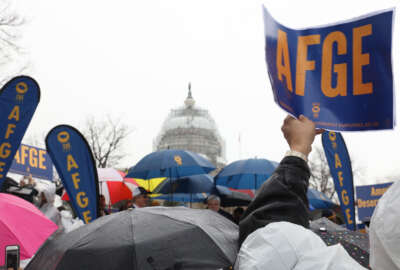Will one of former President Trump’s legacies be producing a sudden and unexpected surge in federal union membership? Will his efforts to curtail union rights inside agencies and the war on teleworking be factors in increased union prestige and influence, if not in actual membership? Its too early to tell, of course, but something significant may be happening in your agency, maybe your office!
Consider this:
Outside of the U.S. Postal Service, the vast majority of federal civil servants DO NOT belong to any sort of union. Never have. They don’t join unions. They don’t pay dues. They don’t participate at union meetings. They don’t go to union conventions. Or vote in local or national union elections.
At the same time, most rank-and-file feds are represented by unions. And unions are required to support nonmembers in the same bargaining unit the same as they support dues-paying members. And the nonmembers also get the same benefits — from pay to retirement changes to work rules — as those who pay dues and march at rallies. None of this is surprising.
Nor is it surprising that when unions talk about their membership and clout, especially to politicians, they cite how many people they represent, not the actual number of members — which is often much, much smaller. It’s called putting your best foot forward. And its true!
Bottom line…
Some nonmembers think that unions are unnecessary. Or too political, too predictably Democratic in their endorsements. To the point, some on both sides would argue, that Democrats often take union support for granted, while Republicans see them as a lost cause.
Many union members think their unaffiliated colleagues are free riders! Too cheap or wimpy (or both) to join the fight! But that the independent thinkers/free riders (choose one) are all too happy to share in any benefits won by unions.
What are the signs, if any, that unions may become much more powerful players in the federal arena? Let’s start close to home. Real close in fact.
Federal News Network has had a pretty good array of stories on the topic. Lots of subjects, lots of variety, a fair share of scoops. But of all of them, the one that got the most hits by far and attracted the most eyes was headlined: “VA announces plans to restore collective bargaining and official time.”
Important of course. But not the if-it-bleeds-it-leads kind of story that is usually number one. Or in the federal market, one about pay, retirement, buyouts or layoffs that normally get the most attention. But this one was the one! Not about pay or benefits, but a return to power for unions. And it could be that people noticed it because of the Trump administration’s actions toward unions and the way it viewed the career civil service. Backlash? We’ll see!
Will VAs actions raise the profile of unions with more feds? And will that translate into more cash flow for unions as more people sign up?
Could new interest in unions be a signal to Democrats — who sometimes do take feds for granted — to be a little more attentive? Could it also show Republicans that feds (or even Democrats) are not just hostiles, but rather most are dedicated public servants, and voters that are deserving of more respect?
Stay tuned!
Nearly Useless Factoid
By Alazar Moges
Pioneering scientist Marie Curie was the first person ever to win two Nobel Prizes. She is also one of only two people in history to win in two different fields.
Source: Live Science
Copyright
© 2024 Federal News Network. All rights reserved. This website is not intended for users located within the European Economic Area.

